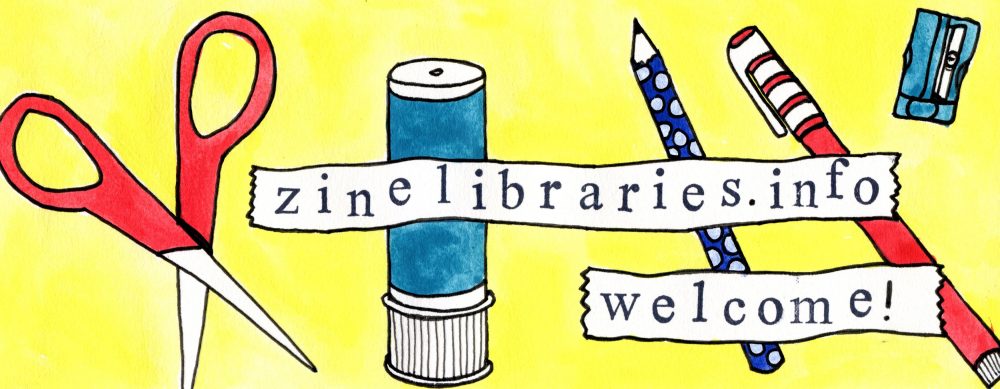UTC – 21:30
Resources from Chat:
https://zines.wolfsonian.org//zines/all/thumbs/?o=3
https://anneelizabethmoore.com/how-to-make-this-very-zine/
http://zinelibraries.info/running-a-zine-library/teaching-with-zines/
http://zineopolis.blogspot.com/
https://zines.barnard.edu/zine-classes-and-workshops
http://welcometocup.org/Projects
http://welcometocup.org/Projects/UrbanInvestigations
https://sodelightful.com/comics/political/
Session Notes:Â
Teaching with zines can be done in a variety of contexts. Ella shared a poll at the start to see how many of the session participants teach with zines.Â
Ella’s introduction to zines was from a “secret” collection at their library. Some professors found her and they were excited to be able to make zines. Ella has now been making zines for 20 years, and there are many connections to other areas of independent publishing including to artist’s books.
There are ethical questions about zine holdings in libraries, which was discussed and acknowledged. Zines noticeably can be a place for people to connect, bringing them into an academic context can change this dynamic of the original intention. But, it’s so much fun to work with zines.
School libraries can be a great place to teach with them, due to the low barrier to entry. Anyone in k-12 can make something and it can be a great way to get kids creating. Zines are a less intimidating way to self-publish your own ideas enabling all participants to feel they can have a voice.Â
The discussion moved on to making zines to teach specific skills vs teaching how to make zines. E.g. A ‘Self-defence’ zine workshop, in the format of a mini zine works well (this micro-format is easily hidden or carried in a pocket and is something you might not want to share with family members). Small, simple formats (such as the one page folded zine)Â also can provide greater accessibility because they’re easy to produce in multi-language versions.
Community knowledge-share was also considered important such as how to cook, how to register to vote, basic skills etc.
Zoe Welch: On teaching senior high school kids spoke about how zines can be used to teach languages / arts on fully funded programs. Lots of different topics were then covered, about advancing the conversation around the usefulness of zines in an educational context. Zoe did place emphasis on the hand made qualities and spoke about sharing her students zines at fairs and running workshops at these venues.Â
She explained about STEAM zines for middle school – subjects such as climate change. Zoe tables with the students zines at the Miami Zine Fest. She said that in her experience, they could help teens have the confidence to be more authentic, different than how they act online with others. For credit, prof. development for teachers, Zines can be a great way for young people to communicate with their peers and others and get their voice out.Â
Ella spoke about how to use zines as a tool to teach taught subjects or to tackle particular issues such as politics – getting people to attend local government sessions (which can be daunting) or a zine ‘2020 voting guide’. Ella said she enjoyed zines that have an interactive element such as ‘fill-in-the-blank, as this was a great way to get readers to start participating – an engaging teaching and learning tool.Â
Zines were cited through the discussion as very useful as guides for intimidating events or activities. There was also consideration of supportive zines created to advise and help people on how to take action, well-being, community.
Zinelibrary.info’s teaching guide is used by many and Barnard’s teaching with zines resources are also thought of by all as particularly great.
 Teaching with Zines, Kathleen Aragon, Deanie Adams, Jolie Braun, Emma Fernhout, Juli Huddleston, Kelly McElroy, Sarah G. Wenzel, and Kelly Wooten (2018) .
Teaching with Zines, Kathleen Aragon, Deanie Adams, Jolie Braun, Emma Fernhout, Juli Huddleston, Kelly McElroy, Sarah G. Wenzel, and Kelly Wooten (2018) .
Kelsey Smith: Explained a 24-hours zine creation event, (initial idea from the Portland Zine Symposium). Kelsey said 24-hours for the first event was way too much and it was exhausting! Later planned events were shorter and more planned by bringing in supplies such as a typewriter, glue,scissors, pens etc. The unlocked photocopier was really popular. Aggie Burstein has also done ‘cooking class’ zine presentations as part of a zine assignment for South Puget Sound Community College Culinary Arts program. The baking program teacher Melanie Shelton (who is also an Olympia Zine Fest organizer) assigned a zine resume/why they became a baker, for many students this is an intro to what a zine is.Â

Olimpia: Shared link to CUP (Centre for Urban Pedagogy) where teaching artists help students engage with their community, not simply seeking to impose answers.Â
The example on the shared link showed how artists worked within a community in order to visualise and share experience/knowledge.
Ella concluded the event saying there was not enough time to add a recipe activity and encouraged participants to submit to the ‘Cook Zine’ after the event.
